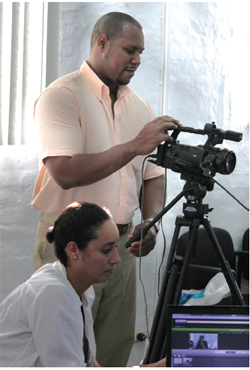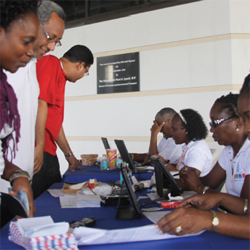![]()
![]()
![]()
The current year has been an active one for the Information Systems Division (ISD) as it furthered the CXC® transformation agenda. On 1 January 2012, the Division took the payroll component of the HR application into ‘LIVE’ production after an intense two months testing period. In tandem with the HR application, the Caribbean Primary Exit Assessment (CPEA™) was piloted in Anguilla and Grenada with both territories reporting positively on the experience. CXC also supported the Ministry of Education in St Maarten as it took full responsibility for the administration of the FBE (Grade 6) examinations. The St Maarten officials were very satisfied with the technological support provided. Fortunately, with the short time frame, the challenges associated with the implementation were not insurmountable given the similarities with the CPEA™ offering. Another significant milestone was the use of our video conferencing facility for the annual Inter-Divisional meeting between the WZO and EZO technical teams. The facility was also successfully used to support ‘E-Grading’ in August, with significant cost savings. Additional benefits of this facility were realised where resource persons did not have to spend otherwise productive time travelling for the short meetings. During each technology refresh cycle there is a need for a period of consolidation; this year internal training sessions were provided for all our end-users over a three month period (March – June). Through the technological improvements across the organisation, CXC did extremely well in the NISE “100 Improvements in 100 days” innovation drive. Each person in Team-ISD contributed at least one innovation. Congratulations to Andre Blair and Sheldine Robinson; Andre made it in the top three nominations for Innovation, while Sheldine clinched the internal award for The Most Innovative project. Well done everyone! In support of our strategic goal to improve service delivery; the training of our team members continued in the ITIL Framework, core technologies and security. Monitoring platforms were improved, being augmented by the ratification of the security policy and process maps. The strengthening of our virtual infrastructure continued throughout the year in Barbados and Jamaica. This allowed for the deployment of more robust end-user services, particularly during the peak season. In keeping with the Business Process Review (BPR) recommendations of March 2010, consolidation of our platforms and standardisation of the user interfaces also continued throughout the year. The web portals (CVQ, EXPERTS, ORS and Markers) were enhanced to improve performance and the end-user experience. While the feedback from our stakeholders has mostly been positive, the work continues as the technologies evolve. The work on our e-Marking solution continued in 2012 and is expected to take even greater prominence in 2013. Over 60 resource persons were involved in the testing of an e-Marking solution across four CSEC® subjects: Caribbean History, English A, Mathematics and Principles of Accounts, during the period 20 August to 15 September. CXC anticipates the piloting of an e-Marking solution during the 2013 examinations cycle, provided the business case analysis supports it. The consolidation of our applications platform and improvements to our business continuity strategies will remain in focus during the upcoming year. Service Level Management will be enhanced to support the Service Level Agreements, and our Service Operations will be streamlined with the use of ITIL compliant applications. CXC’s new building is taking shape and Team-ISD has begun planning for the ‘live transition’. The Item Bank has utilised ICT to enhance important aspects of the paper development and grading processes. Included among these were:
In addition, EDPD has continued to expand on the use of ICT to solicit and receive items. In 2012 this method resulted in 1,289 multiple choice and 363 structured items being added to the Item Bank. |
|



